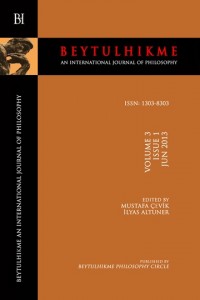Abstract
Bu makalenin temel konusu, “merhamet” kavramını Nietzsche’nin metinleriyle birlikte incelemektir. “Merhamet” kavramı Nietzsche’nin değer yargılarını yeniden değerlendirme projesinde önemli bir yere sahiptir. “Merhamet”, Hıristiyan ahlakında “iyi” olarak değerlendirilir ancak Nietzsche’ye göre o, köle ahlakına ait bir kavramdır. Nietzsche, Hıristiyanlığın merhamet anlayışını eleştirirken kendi merhamet anlayışını da oluşturur. O, geleneksel merhamet anlayışının yalnızca yaşam karşısında test edilerek aşılabileceğini düşünür. “Merhamet”, güç istencini azaltır ve yaşamı zayıflatır. Bu nedenle Nietzsche, onu mahkûm eder ve ardından kendi merhamet anlayışını “bencillik”, “sevgi”, “dostluk” ve “sertlik” gibi kavramlarla ilişkilendirir.
Keywords
References
- Cameron, F. (2002). Nietzsche and the ‘Problem’ of Morality. New York: Peter Lang Publishing.
- Janaway, C. (2007). Beyond Selflessness: Reading Nietzsche’s Genealogy. Oxford: Oxford University Press.
- Kuçuradi, İ. (1997). Nietzsche ve İnsan. Ankara: Türkiye Felsefe Kurumu Yayınları. Nietzsche, F. (1966). Beyond Good and Evil: Prelude to a Philosophy of the Future, Translated, with Commentary, by Walter Kaufmann, Vintage Books – A Division of Random House, New York.
- Nietzsche, F. (1968). The Will to Power (trans. W. Kaufmann & R.J Hollingdale). New York: Vintage Books.
- Nietzsche, F. (1996a). Ecce Homo: Kişi Nasıl Kendisi Olur (çev. C. Alkor). İstanbul: Say Yayınları.
- Nietzsche, F. (1996b). Zerdüşt Böyle Diyordu (çev. O. Derinsu). İstanbul: Varlık Yayınları.
- Nietzsche, F. (1998). Ahlakın Soykütüğü Üstüne (çev. A. İnam). İstanbul: Gündoğan Yayınları.
- Nietzsche, F. (2001a). İyinin ve Kötünün Ötesinde: Bir Gelecek Felsefesini Açış (çev. A. İnam). İstanbul: Yorum Sanat Yayınevi.
- Nietzsche, F. (2001b). The Gay Science (trans. J. Nauckhoff). Cambridge: Cambridge University Press.
- Nietzsche, F. (2003c). Tan Kızıllığı (çev. Ö. Saatçi). İstanbul. Say Yayınları.
- Nietzsche, F. (2003b). İnsanca, Pek İnsanca (çev. C. Atila). İstanbul: Say Yayınları. Nietzsche, F. (2003a). Deccal (çev. O. Aruoba). İstanbul: İthaki Yayınları.
- Nussbaum, C.M. (1994). Pity and Mercy: Nietzsche’s Stoicism. Nietzsche, Genealogy, Morality: Essays on Nietzsche’s Genaology of Morals (ed. R.L. Schacht). Berkeley: University of California Press.
- Örnek, S.A. (2012). Nietzsche’de Yaşama Sorunu. İstanbul: Belge Yayınları.
- Reginster, B. (2012). Compassion and Selflessness. Brown University. http://jepson. richmond.edu/conferences/sympathy2012/Compassion%20and%20 Selflessness.FINAL.pdf
- Schopenhauer, A. (2009). Merhamet (çev. Z. Kocatürk). İstanbul: Dergah Yayınları.
- Türkyılmaz, Ç. (2004). 19.yy’da Geleneğe Başkaldırma: Kierkegaard, Marx, Nietzsche. Yayınlanmamış Doktora Tezi. Ankara. Hacettepe Üniversitesi Sosyal Bilimler Enstitüsü. Özet: Bu makalenin temel konusu, “merhamet” kavramını Nietzsche’nin metinleriyle birlikte incelemektir. “Merhamet” kavramı Nietzsche’nin değer yargılarını yeniden değerlendirme projesinde önemli bir yere sahiptir. “Merhamet”, Hıristiyan ahlakında “iyi” olarak değerlendirilir ancak Nietzsche’ye göre o, köle ahlakına ait bir kavramdır. Nietzsche, Hıristiyanlığın merhamet anlayışını eleştirirken kendi merhamet anlayışını da oluşturur. O, geleneksel merhamet anlayışının yalnızca yaşam karşısında test edilerek aşılabileceğini düşünür. “Merhamet”, güç istencini azaltır ve yaşamı zayıflatır. Bu nedenle Nietzsche, onu mahkûm eder ve ardından kendi merhamet anlayışını “bencillik”, “sevgi”, “dostluk” ve “sertlik” gibi kavramlarla ilişkilendirir. Anahtar Kelimeler: Merhamet, Hıristiyan ahlakı, güç istenci, iyi, acı.
Abstract
In this article, main focus is to examine “compassion” concept with Nietzsche’s texts. “Compassion” concept has an important place in Nietzsche’s Project of reevaluation of value judgments. “Compassion” has been evaluated as “good” by Christian morality, but according to Nietzsche, it is a concept which belongs to slave morality. When Nietzsche criticizes Christian’s sense of compassion, he also constitutes his own sense of compassion. He thinks that sense of traditional compassion only can be overcome by tested on the face of life. Compassion decreases “will to power” and brings down life. For this reason Nietzsche condemns it and then relates to his own sense of compassion to “selfishness”, “love”, “friendship”, “strictness” etc.
Keywords
References
- Cameron, F. (2002). Nietzsche and the ‘Problem’ of Morality. New York: Peter Lang Publishing.
- Janaway, C. (2007). Beyond Selflessness: Reading Nietzsche’s Genealogy. Oxford: Oxford University Press.
- Kuçuradi, İ. (1997). Nietzsche ve İnsan. Ankara: Türkiye Felsefe Kurumu Yayınları. Nietzsche, F. (1966). Beyond Good and Evil: Prelude to a Philosophy of the Future, Translated, with Commentary, by Walter Kaufmann, Vintage Books – A Division of Random House, New York.
- Nietzsche, F. (1968). The Will to Power (trans. W. Kaufmann & R.J Hollingdale). New York: Vintage Books.
- Nietzsche, F. (1996a). Ecce Homo: Kişi Nasıl Kendisi Olur (çev. C. Alkor). İstanbul: Say Yayınları.
- Nietzsche, F. (1996b). Zerdüşt Böyle Diyordu (çev. O. Derinsu). İstanbul: Varlık Yayınları.
- Nietzsche, F. (1998). Ahlakın Soykütüğü Üstüne (çev. A. İnam). İstanbul: Gündoğan Yayınları.
- Nietzsche, F. (2001a). İyinin ve Kötünün Ötesinde: Bir Gelecek Felsefesini Açış (çev. A. İnam). İstanbul: Yorum Sanat Yayınevi.
- Nietzsche, F. (2001b). The Gay Science (trans. J. Nauckhoff). Cambridge: Cambridge University Press.
- Nietzsche, F. (2003c). Tan Kızıllığı (çev. Ö. Saatçi). İstanbul. Say Yayınları.
- Nietzsche, F. (2003b). İnsanca, Pek İnsanca (çev. C. Atila). İstanbul: Say Yayınları. Nietzsche, F. (2003a). Deccal (çev. O. Aruoba). İstanbul: İthaki Yayınları.
- Nussbaum, C.M. (1994). Pity and Mercy: Nietzsche’s Stoicism. Nietzsche, Genealogy, Morality: Essays on Nietzsche’s Genaology of Morals (ed. R.L. Schacht). Berkeley: University of California Press.
- Örnek, S.A. (2012). Nietzsche’de Yaşama Sorunu. İstanbul: Belge Yayınları.
- Reginster, B. (2012). Compassion and Selflessness. Brown University. http://jepson. richmond.edu/conferences/sympathy2012/Compassion%20and%20 Selflessness.FINAL.pdf
- Schopenhauer, A. (2009). Merhamet (çev. Z. Kocatürk). İstanbul: Dergah Yayınları.
- Türkyılmaz, Ç. (2004). 19.yy’da Geleneğe Başkaldırma: Kierkegaard, Marx, Nietzsche. Yayınlanmamış Doktora Tezi. Ankara. Hacettepe Üniversitesi Sosyal Bilimler Enstitüsü. Özet: Bu makalenin temel konusu, “merhamet” kavramını Nietzsche’nin metinleriyle birlikte incelemektir. “Merhamet” kavramı Nietzsche’nin değer yargılarını yeniden değerlendirme projesinde önemli bir yere sahiptir. “Merhamet”, Hıristiyan ahlakında “iyi” olarak değerlendirilir ancak Nietzsche’ye göre o, köle ahlakına ait bir kavramdır. Nietzsche, Hıristiyanlığın merhamet anlayışını eleştirirken kendi merhamet anlayışını da oluşturur. O, geleneksel merhamet anlayışının yalnızca yaşam karşısında test edilerek aşılabileceğini düşünür. “Merhamet”, güç istencini azaltır ve yaşamı zayıflatır. Bu nedenle Nietzsche, onu mahkûm eder ve ardından kendi merhamet anlayışını “bencillik”, “sevgi”, “dostluk” ve “sertlik” gibi kavramlarla ilişkilendirir. Anahtar Kelimeler: Merhamet, Hıristiyan ahlakı, güç istenci, iyi, acı.
Details
| Primary Language | Turkish |
|---|---|
| Journal Section | Articles |
| Authors | |
| Publication Date | June 30, 2013 |
| Published in Issue | Year 2013 Volume: 3 Issue: 1 |


